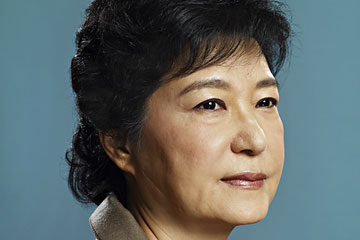
"I know how fleeting and, at times, harrowing political power can be," says Park Geun-hye
(2 of 2)
Park was studying in Paris when her mother, Yuk Young-soo, was killed in a failed assassination attempt on Park's father. On Aug. 15, 1974, Park Chung-hee was speaking before a packed house at Seoul's National Theater when a North Korean sympathizer opened fire. The first shot missed its mark; the second hit the First Lady, who died later that day.
The story of Park Chung-hee's reaction to the shooting has become legend. As his wife was carried off the stage, he returned to the microphone. "Ladies and gentlemen," he said, "I will continue my speech." Her mother's death made Park Geun-hye, just 22, the de facto First Lady--a role that earned her much goodwill.
But being a dictator's daughter exacts a toll. Her father tightened his hold on the country until, in 1979, he was shot dead at a dinner by his intelligence chief for reasons that remain unclear. Throughout the 1970s, thousands of opposition figures were arrested and sometimes tortured under draconian security regulations. Despite violent crackdowns by Park Chung-hee and his autocratic successors, also military men, the struggle for liberty persisted until 1987, when the country held its first free and fair presidential election in decades.
After her father's assassination, Park retreated from the spotlight but eventually returned to political life. In 1998 she became a legislator, and she was re-elected four times. While she was campaigning in 2006, an ex-convict lunged from a crowd and slashed her with a box cutter. Television footage shows Park calmly trying to stanch the bleeding from the four-inch gash to her right cheek. A recent TV spot turns her still visible scar into a metaphor for sacrifice and national healing. "The wound inflicted that day ... changed me completely," she narrates. "Since then I have decided to dedicate the rest of my life tending to your wounds."
Park, however, has shied away from explicitly criticizing her father for the wounds he inflicted. In September, as public pressure mounted, she said in a television address, "In the shadows of South Korea's rapid growth, there was pain, suffering and irregularities as well as various human-rights abuses committed by authorities ... I deeply apologize to all those who were personally hurt and family members of victims of government abuse." Her statement satisfied few. Conservatives accused her of caving; liberals questioned her sincerity. But that seems to be the end of what she's prepared to say about the matter. Thus, for Park to win, much of the electorate has to be ready to forgive or forget the past. Perhaps then South Korea will forge a new future.
